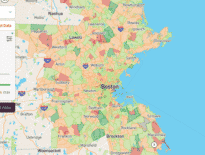
Tom Curry
The national debate surrounding the regulation of financial technology companies, also known as fintechs, continues to grow almost as quickly as the industry itself. Just in the last few months, the Office of the Comptroller of the Currency (OCC), the Conference of State Bank Supervisors (CSBS) and the Federal Reserve have all increased their attention to fintech regulatory issues, as certain fintechs continue to consider the benefits and costs of pursuing the OCC’s special–purpose national bank charter for fintechs.
This substantive regulatory “competition” of sorts is a positive development towards establishing a strong “dual fintech system” that could lead to, among other things, giving the industry meaningful federal and state charter optionality.
The most notable issue is state regulators’ continued opposition to the fintech charter. The CSBS and the New York Department of Financial Services have both recently refiled previously dismissed lawsuits challenging the OCC’s legal authority to grant a fintech charter. The OCC in motions to dismiss has argued that the lawsuits continue to be unripe, and it articulated its substantive arguments supporting its broad chartering authority and its deference to interpret what “the business of banking” means.
The core issue is whether a fintech must receive deposits to be considered a “bank” or whether paying checks or lending money, as the OCC has interpreted it by regulation, is sufficient to qualify a fintech as carrying out the “business of banking” to be granted a fintech charter. This battle is likely to continue and present at least some legal uncertainty and delay, which certain fintechs will need to consider as they weigh whether to apply for a fintech charter or to remain regulated on a state-by-state basis.
Panel Recommends Regulatory Overhaul
The fintech charter debate arguably has already spurred regulatory efficiencies. The CSBS, likely in response to the fintech charter, launched its own fintech initiative and recently published the recommendations of its Vision 2020 Fintech Industry Advisory Panel work streams on payments and lending.

Jason J. Cabral
The recommendations attempt to address key obstacles to state regulation that make the fintech charter appealing to certain fintechs, such as the prospect of avoiding 50 different state regulatory regimes and multiple licensing and supervision processes in favor of a single federal regulator and rulebook. The CSBS recommendations include, among others, the development of a 50-state model law for money services businesses, expansion of multistate licensing to include all state regulators and all non-bank industries that are supervised at the state level and creating a new multistate examination system.
The panel also highlighted items of future considerations, some of which include harmonized statutory and regulatory definitions and interpretations of key terms and adopting consistent disclosure requirements. As expected with any massive multistate regulatory overhaul, certain recommendations will be difficult to implement, which could continue to make the fintech charter more appealing to certain fintechs.
Uncertainty over Fed’s Position
To date, the Fed has been relatively silent on whether special purpose national banks would be permitted to have access to its payment systems and other services. Its views were somewhat revealed in a recent motion to dismiss filed in the Southern District of New York. There, the Fed argued that “Federal Reserve Banks have discretion over whether to accept deposits from banks, and thus have discretion to deny deposit account requests … .”
The Fed’s motion responded to a Connecticut-chartered special purpose bank’s lawsuit that demanded access to a deposit account at the Fed and the favorable interest on excess reserves, which the Fed argues it has discretion to allow access.
Relatedly, in a recent advance notice of proposed rulemaking (ANPR), the Fed also suggested that it may not be inclined to allow pass–through investment entities, a type of special purpose financial institution, to have access to all of its services.

Dan Hartman
This ANPR and related litigation could potentially present a concern for fintechs looking to avail themselves of the Fed’s payment systems, settlement services and other resources through a fintech charter. Importantly, the ANPR draws a clear distinction between special state charters for depository institutions with narrowly focused business models and entities that are subject to federal prudential regulation and the same set of capital and other prudential requirements as other federally regulated banks. The ANPR seems to support the view that an OCC-chartered special purpose national bank would be held in a more favorable light.
The “business of banking” is rapidly changing and thus the regulatory framework surrounding banking is changing with it. The changes in the industry and the regulatory responses at the federal and state level are important for continued growth and innovation but will include uncertainty as these new frameworks develop.
Thomas J. Curry and Jason J. Cabral are partners in Nutter’s corporate and transactions department. Daniel W. Hartman is an associate, pending admission to the Massachusetts Bar, in Nutter’s litigation department. Curry is a former U.S. comptroller of the currency and all are members of the firm’s banking and financial services group.




 |
| 

